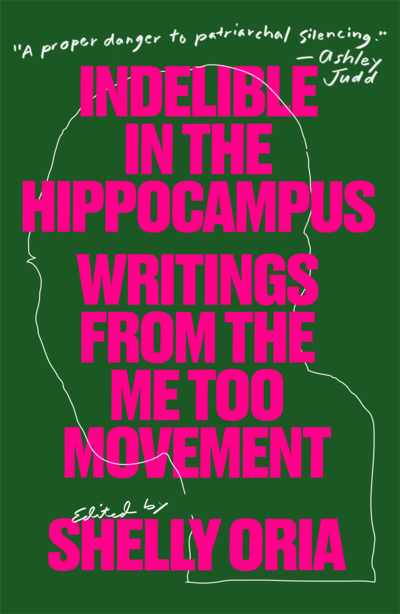
Go Forth is a series that offers a look at contemporary literature and publishing, started by Brandon Hobson and Nicolle Elizabeth in 2012.
Indelible in the Hippocampus collects stories, poems, and essays on the #MeToo movement, and gets its title from Dr. Christine Blasey Ford’s testimony to the US Congress on Brett Kavanaugh’s nomination to the Supreme Court. The contributors include Melissa Febos, Kaitlyn Greenidge, Elissa Schappell, Samantha Hunt and many others. The breadth of this anthology from diverse voices is as impressive as its hard-hitting commentary. It’s an important book, coming out at an important time.
—Robert Lopez
THE BELIEVER: How did this book come about? In the foreword you write about having recently written a short story that deals with sexual harassment, which almost coincided with the first publicized case of the #MeToo movement. Did you ever consider writing a group of stories about this subject matter yourself or did you conceive of it from the get-go as an anthology?
SHELLY ORIA: The book came about when I emailed Kristina Kearns—then Executive Director of McSweeney’s—asking if she’d like to publish a short story I’d just finished. This was October 2017, soon after Harvey. To be honest, I never imagined #MeToo would become the global movement it’s become; I assumed the conversation and revived hashtag would stay in the news for a week at most. That story I’d written, “But We Will Win,” is told from the PoV of a woman whose ex-girlfriend ran into traffic to escape sexual street harassment. The narrator began murdering men on occasion after that as a way of coping with her grief and rage. I emailed Kristina thinking I should try to publish this timely story of mine as soon as I could. My email started an exchange between us; pretty soon we were talking about a book, and soon after that Kristina asked if I’d be the editor.
I never considered writing a collection of my own about this topic, no. I don’t think I even realized I’m often writing about various types of sexual violence against women; I only noticed that recently, because through my work on Indelible I’ve become so practiced in viewing texts through that lens. Apparently, about half of what will one day be my next collection are “#MeToo” stories. But that’s not dissimilar from the experience I had with my first book where in the early stages my agent said, “Most of your stories explore how sexuality and nationality interact,” and I said “They do?” and then realized they absolutely did, almost without exception.
BLVR: What were some of the challenges of editing such an anthology? How does the experience differ from...
You have reached your article limit
Sign up for a digital subscription and continue reading all new issues, plus our entire archives, for just $1.50/month.
Already a subscriber? Sign in




